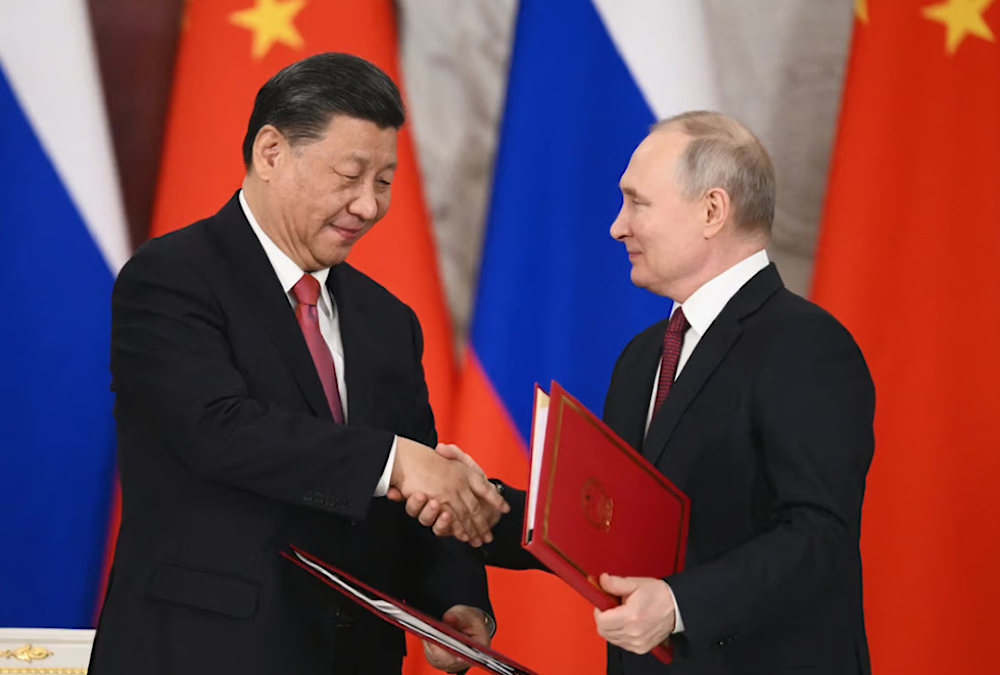According to Responsible Statecraft, de-dollarization activities enable Russia and China to evade the restrictions that now hinder Moscow from conducting business on the international market.
-

Russian President Vladimir Putin and China’s President Xi Jinping shake hands during a signing ceremony following their talks at the Kremlin in Moscow on March 21, 2023. (AFP)
Russia declared this week that its bilateral trade with China had nearly fully transitioned away from the US currency, demonstrating the two nations’ determination to reduce their reliance on the US-led economic system.
According to Responsible Statecraft, Aside from lessoning reliance on the Western-dominated global currency, these de-dollarization activities enable Russia and China to evade the numerous restrictions that now hinder Moscow from conducting business on the international market.
Last month, Russian Deputy Prime Minister and Minister of Trade Denis Manturov announced that Russia and Venezuela are exploring avenues for the use of digital payment mechanisms in trade to secure transactions against Western interference.
Western sanctions have contributed to a 26% increase in trade between Moscow and Beijing since 2022, reaching $240 billion this year. China has also become the world’s largest consumer of Russian oil.
Russia is also spending billions of dollars to avoid Western sanctions by building new trade routes in Asia, particularly Russia to Kyrgyzstan via the Caspian Sea and Belarus to Pakistan. The attempts expand on prior trade redirection ideas, such as the North-South Corridor, a railway line originally proposed in 2000 to connect Russia to the Indian Ocean via Iran.
After years of delays, Moscow granted Tehran a 1.3 billion euro loan last year to complete its section of the North-South line. Sergei Ivanov, Russia’s presidential envoy for ecological issues, explained that the corridor allows Russia complete access to the Persian Gulf and that “no sanctions will affect it.”
Russia and Iran have also integrated their financial systems while facing restrictions that limit their ability to transact with the West.
According to Markus Jaeger of the Atlantic Council, if Russia delivers products through overland pathways outside the authority of sanctioned nations, this would reduce “dependency and vulnerability vis-a-vis unfriendly third parties.”
Jaeger explained that the US pressure has also hindered Russia’s economic relationship with China, which may face costs from the West for its backing for Moscow, citing Secretary of State Antony Blinken’s scheduled visit to China this week, where he is expected to attempt to persuade China to cut alleged support for Russia’s defense industrial base amid the war in Ukraine.
According to Jaeger, as China engages more economically with sanctioned nations or companies in Iran or Russia, the potential of being a target of European and American sanctions increases.
“For the US, imposing secondary sanctions that affect Chinese entities is seen as a very antagonistic step by China, which risks leading to further tensions in US-Chinese relations.”
Russia, China reach near complete de-dollarization in bilateral trade
During a gathering of the Council of Heads of Russian regions under the Foreign Ministry on Monday, Russian Foreign Minister Sergey Lavrov said that Russia and China have significantly reduced their reliance on the dollar in business transactions, opting for national currencies in over 90% of mutual payments.
Lavrov cited the resilience of Russian-Chinese trade and economic cooperation for this development despite facing challenges from Western states.
“Russian-Chinese trade and economic cooperation are actively developing, despite the persistent attempts of the states of the collective West to put a spoke in the wheels,” Lavrov said. “There has been an almost complete de-dollarization of bilateral economic relations. Today, more than 90% of mutual payments have been transferred to national currency,” he added.
Progress in the energy sector, agricultural exports to China, and joint investment and industrial projects have also contributed to mutual benefits across the Russian-Chinese border.
“Interaction in the energy sector is steadily advancing. The supply of our agricultural products to the Chinese market is growing. Joint projects are being implemented in the investment and industrial areas. The mutual benefit from such cooperation is clearly felt on both sides of the Russian -Chinese border,” Lavrov further noted.
Tags: Russia China ditch dollar Moscow announces trade corridors
-




